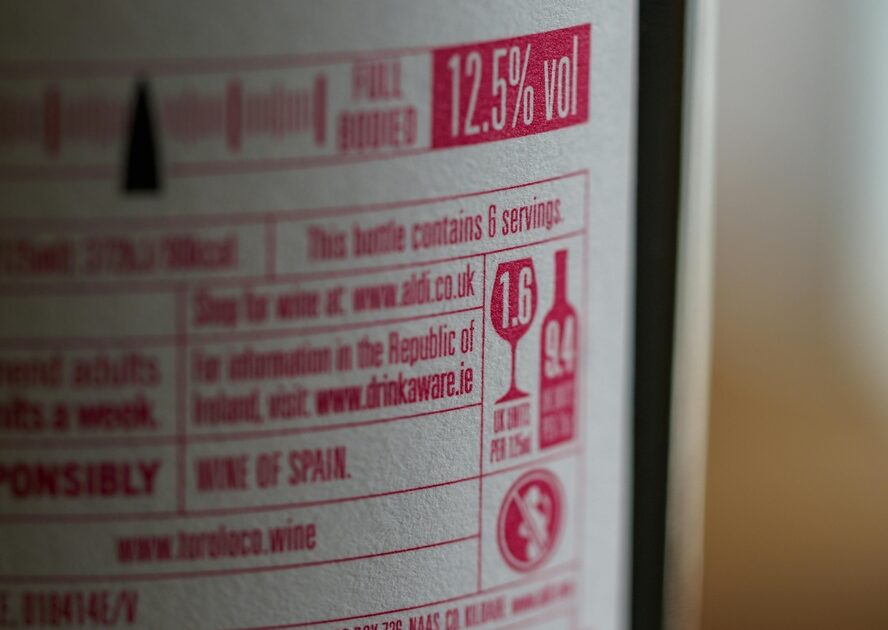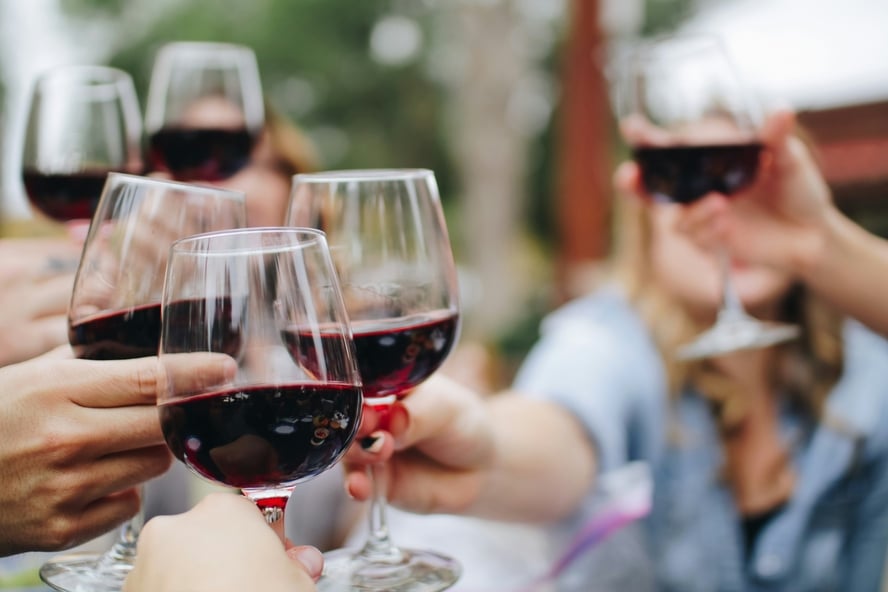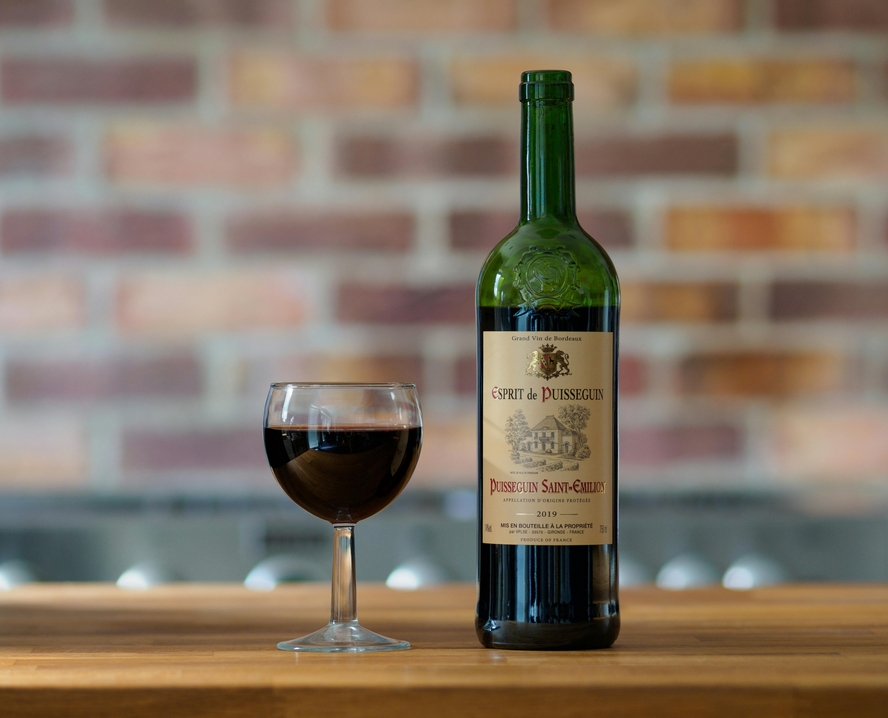
You might want to put down that nightly glass of supposedly heart-healthy red wine. In early January, Surgeon General Dr. Vivek Murthy called for a warning label to be added to all alcoholic beverages, cautioning consumers about the link between alcohol consumption and seven different kinds of cancer. A new report released by the U.S. Department of Health and Human Services identifies alcohol consumption as the third leading preventable cause of cancer, after tobacco use and obesity1.
“Many people out there assume that as long as they’re drinking at the limits or below the limits of current guidelines of one a day for women and two for men, that there is no risk to their health or well-being,” Dr. Murthy told The New York Times2. “The data does not bear that out for cancer risk.”
Is Alcohol Carcinogenic? The Research Linking Alcohol and Cancer Risk
The pool of evidence linking alcohol consumption to cancer is seriously worrying. As early as in 2001, a meta-analysis of more than 200 studies published in Alcohol Research & Health found that alcohol increased the risks for cancers of the mouth, pharynx, esophagus, and larynx and showed “statistically significant increases in risk” for cancers of the stomach, colon, rectum, liver, breast, and ovaries3. So can alcohol give you cancer? Unfortunately, the answer is yes.
Want more breaking news around health and wellness? Sign up for the newsletter for more well-researched, non-toxic living guidance and smart wellness advice.
Following that, the evidence began to pile up. A 2015 study in the International Journal of Epidemiology found that alcohol consumption was associated with increased risk of developing breast cancer, even among women with high folate intake4.
Even more concerningly, a 2013 study in Current Breast Cancer Reports found that even moderate alcohol consumption was linked to an approximate 30 to 50 percent increased risk of breast cancer5. And a shocking 2020 study in the British Journal of Cancer found that just one drink increased the risk of cancers caused by alcohol, including cancers of the mouth and larynx6.

Overall, Dr. Murthy estimated that alcohol consumption contributes to 100,000 cancer cases and 20,000 related deaths annually. In fact, the report shows that consuming just one alcoholic drink a day leads to a 13.1 percent increased risk of developing cancer.
Worldwide, alcohol may cause around 400,000 cancer-related deaths each year7, and according to the World Health Organization, nearly four percent of cancers worldwide can be attributed to alcohol consumption8.
To sum it up, Dr. Pek Kei (Becky) Im, lead researcher of a 2022 genetic study led by Oxford Population Health, put it best: “Alcohol directly causes several types of cancer.”
How Does Alcohol Cause Cancer?
The report identifies four different ways in which alcohol can lead to increased cancer risk.
When alcohol breaks down into acetaldehyde in the body, it can bind to DNA and damage it, causing the cell to grow uncontrollably and metastasize into cancer. Alcohol has also been shown to generate oxidative stress, which increases general inflammation in the body and can damage DNA.
Alcohol consumption also alters hormone levels in the body — crucially, estrogen. This is why alcohol consumption and breast cancer are linked, with one 2009 study in the American Journal of Epidemiology showing that alcohol consumption significantly increased risk of breast cancer in postmenopausal women, with an even stronger association with hormone receptor-positive types of breast cancer9.
Finally, the report shows, alcohol consumption can lead to greater absorption of other carcinogens, like those found in cigarettes. These carcinogens dissolve in alcohol and are then more easily absorbed into the body. All in all, there are more than enough reasons to give up alcohol.
One 2009 study in the American Journal of Epidemiology showed that alcohol consumption significantly increased risk of breast cancer in postmenopausal women, with an even stronger association with hormone receptor-positive types of breast cancer.
Finally, the report shows, alcohol consumption can lead to greater absorption of other carcinogens, like those found in cigarettes. These carcinogens dissolve in alcohol and are then more easily absorbed into the body. All in all, there are more than enough reasons to give up alcohol.
How Much Alcohol is Too Much?
We all know that too much drinking isn’t good for our health. But for decades, moderate drinking was said to help prevent heart attacks, cardiovascular disease, and strokes. One study was even published to this effect in 1999 in Alcohol Research & Health10. Since then, modern experts have critiqued the observational methodology of this research11, and new studies show the opposite is true.
“It’s becoming increasingly clear that there’s no safe amount of alcohol when it comes to cancer prevention.”
Dr. Joseph Mercola, Board Certified Family Medicine Osteopathic Physician
A 2023 study in Epidemiology and Health showed that light to moderate alcohol consumption was linked with increased risk of developing esophageal, colorectal, laryngeal, and breast cancers, and heavy drinking was found to contribute to increased risk of “almost all types of cancer12.”
Even light consumption of alcohol was “significantly” linked to increased risk of esophageal, colorectal, and breast cancers. The World Health Organization says that there is no safe limit when it comes to alcohol and cancer.

“I think the medical community, by and large, has reached a consensus that alcohol consumption, even at low levels, raises the risk of several cancers, including liver, breast, and colorectal cancers,” said Dr. Joseph Mercola, Board Certified Family Medicine Osteopathic Physician (DO) and Author of Your Guide to Cellular Health. “It’s becoming increasingly clear that there’s no safe amount of alcohol when it comes to cancer prevention.”
“I wish we had a magic cutoff we could tell people is safe,” said Dr. Murthy. “What we do know is that less is better when it comes to reducing your cancer risk.” In other words, every opportunity to choose a non-alcoholic drink over an alcoholic one makes a difference.
The Case of Red Wine: It Was Too Good to Be True
Red wine was long celebrated for its purported health benefits, including improved gut, heart, and brain health. But for Dr. Mercola, “the idea that red wine is anti-cancer has been largely misconstrued.”
The idea, he said, “gained popularity after the ‘French Paradox’ observation in the 1980s, which suggested red wine might explain lower heart disease rates in France despite a high-fat diet. This led to decades of oversimplified media narratives about resveratrol, a compound in red wine.”
“Alcohol is a known carcinogen and neurotoxin, and its harmful effects far outweigh any potential benefits of the antioxidants.”
Dr. Joseph Mercola
While resveratrol is indeed a powerful polyphenol, with health benefits ranging from improved brain function to lower cholesterol13, its benefits do not outweigh the negative effects of alcohol.

“Alcohol is a known carcinogen and neurotoxin, and its harmful effects far outweigh any potential benefits of the antioxidants,” said Mercola. “What’s more, resveratrol’s estrogenic activity could exacerbate estrogen dominance, a condition that’s already widespread and linked to hormone-related cancers.”
Rather than drinking red wine for resveratrol, concentrate on red whole fruits like berries or red grapes. According to Mercola, these fruits “deliver these compounds without the health risks.”
When Can We Expect to See the New Label?
These new labels were in large part proposed due to the lack of awareness of the link between alcohol and cancer risk. A 2023 National Cancer Institute study showed that the misconceptions surrounding this link are widespread14.
“Fewer than one in three Americans recognize alcohol as a cause of cancer,” says Harriet Rumgay, researcher at the International Agency for Research on Cancer15.
In Dr. Mercola’s words, “This announcement is long overdue.” He noted that adding on-package warning labels like the ones proposed by Dr. Murthy could significantly enhance public awareness. “Right now, too few people connect alcohol with cancer risks,” he said. “Labels that explicitly state these dangers, much like those on tobacco products, could serve as a crucial wake-up call.”
Ireland is currently slated to become the first country to indicate the “direct link between alcohol and fatal cancers” on alcohol packaging next year. Stateside, however, the label is far from a done deal — only Congress can mandate this sort of label.
The Reason Behind Outdated Labels
The current label has not been updated since it was adopted in 1988 — the very same year that the International Agency for Research on Cancer (IARC) first classified alcoholic beverages as a Group 1 carcinogen.
“Group 1 is the highest level of certainty,” he explained, “meaning there is sufficient evidence in humans to establish a causal link between exposure to the agent and cancer.” So not only is alcohol a carcinogen, but it’s one of the clearest ones.

Five years ago, the scientific report that was used to inform the 2020-2025 dietary guidelines acknowledged alcohol’s carcinogenic properties and recommended “tightening guidelines” by capping the alcohol consumption recommendation for men at one standard drink per day. Ultimately, this change did not make it into the final guidelines.
So if we’ve technically known for years that alcohol is carcinogenic, why isn’t that made more clear? It’s largely industry pushback that has kept the lid on what the medical community has “known and even considered common sense for decades,” says Cameron George, a leading authority on Kava, a natural alternative to alcohol16.
“It just hasn’t been talked about by the industry a lot until recently due to business, marketing, and sales of alcohol incentives being so heavy for so long,” says George. “But now with lots of awareness mounting around public health, mass public support behind it and sharing information independently through the internet, this understanding within the scientific community is finally penetrating into mainstream dialogue.”
Regardless of whether the label is adopted or not, federal dietary guidelines are expected to reflect this data, and two new scientific reviews will inform the updated recommendations. While it may not be easy to remove alcohol from the mainstream overnight (especially in the absence of warning labels on our bottles), small steps make a difference. The next time you reach for that bottle of wine, remember that there’s compelling evidence to consider a mocktail instead.
Sources:
- https://www.hhs.gov/surgeongeneral/priorities/alcohol-cancer/index.html
- https://www.nytimes.com/2025/01/03/health/alcohol-surgeon-general-warning.html
- https://pmc.ncbi.nlm.nih.gov/articles/PMC6705703/
- https://pubmed.ncbi.nlm.nih.gov/26320033/
- https://pmc.ncbi.nlm.nih.gov/articles/PMC3832299/
- https://pubmed.ncbi.nlm.nih.gov/32830199/
- https://www.ndph.ox.ac.uk/news/new-genetic-study-confirms-that-alcohol-is-a-direct-cause-of-cancer
- https://www.cancer.gov/news-events/cancer-currents-blog/2023/cancer-alcohol-link-public-awareness
- https://pmc.ncbi.nlm.nih.gov/articles/PMC2727171/
- https://pmc.ncbi.nlm.nih.gov/articles/PMC6761693/
- https://www.health.harvard.edu/heart-health/is-moderate-drinking-heart-healthy
- https://pubmed.ncbi.nlm.nih.gov/37905315/
- https://pubmed.ncbi.nlm.nih.gov/26845555/
- https://www.cancer.gov/news-events/cancer-currents-blog/2023/cancer-alcohol-link-public-awareness
- https://www.npr.org/sections/goatsandsoda/2021/07/16/1016586837/new-study-says-nearly-3-4-million-cancers-a-year-linked-to-alcohol-use
- https://dunnpelliermedia-com.dmailroute.net/x/d?c=43051797&l=26f45825-d3c0-41b6-9f8d-9235feef669a&r=842a1cb4-6697-47ed-b134-2599087e89e9

